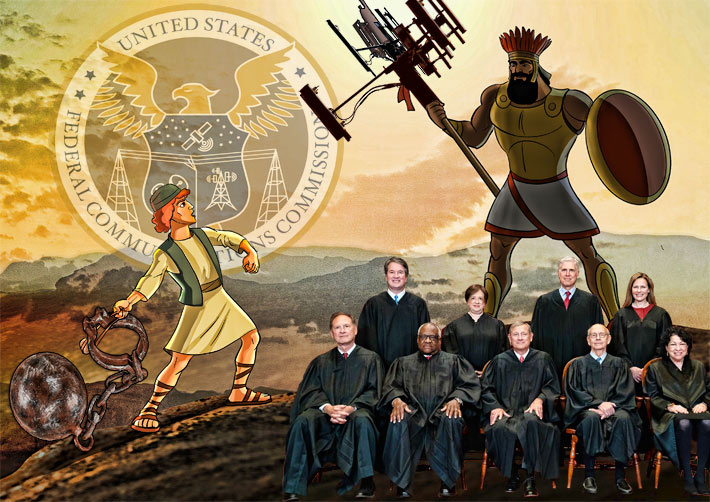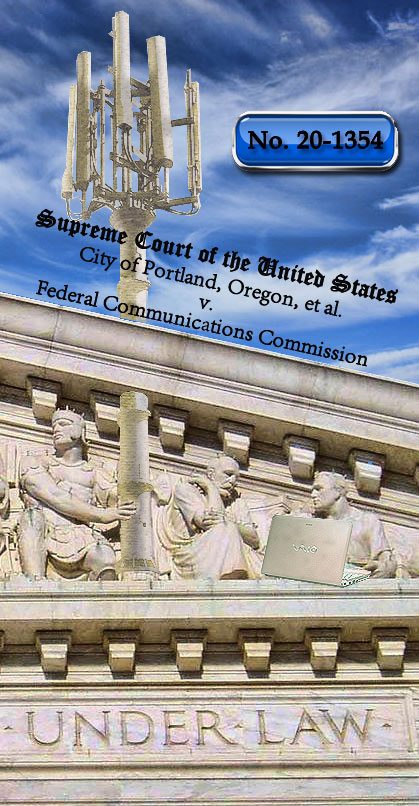
SLINGING A SHOT AT THE FCC – In support of Portland, Oregon’s request for the U.S. Supreme court to reopen challenges to the FCC’s small cells order, municipal associations said in their brief that this is a match between David and Goliath and the FCC has tied David’s hands behind his back and taken away his slingshot. The FCC is arguing that it has always been a fair contest and the Ninth Circuit was as wise as Solomon and made the correct decision.
The FCC, DOJ, carriers and wireless organizations strongly voiced their opinions last week to the U.S. Supreme Court that the high court should not consider the City of Portland, Oregon’s request to reopen challenges to the FCC’s 2018 orders that allowed the nation’s wireless operators to standardize the installation of 5G small cells on the local level in municipal rights of way.

The FCC and DOJ believe there is no reason to review the Ninth Circuit’s smackdown since Portland has not presented any claims that are worthy of the court’s review. View Portland’s petition.
According to two briefs filed on June 2, 2021, the FCC rightfully fulfilled all of its rulemaking obligations when it limited how much discretion localities have to influence 5G permitting decisions, and the Ninth Circuit correctly agreed with the FCC’s actions after Portland appealed.
In 2018, the FCC issued the Small Cell Order, which construed two provisions of the Telecommunications Act of 1996 that preempt state or local measures that “prohibit or have the effect of prohibiting” interstate communications services. The agency issued the order after reviewing considerable evidence that some States and localities had adopted policies, such as charging exorbitant fees to site wireless infrastructure used to provide next-generation 5G wireless service, that would “impede the provision of telecommunications service.”
Portland argues that the Ninth Circuit’s decision was inconsistent with other rulings
On March 22, 2021, Portland petitioned the high court along with 35 municipalities to review the Ninth Circuit’s ruling that they believe construed the phrase “effect of prohibiting” in 47 U.S.C. §253(a) and §332(c)(7)(B) to preempt any state or local requirement preventing a telecommunications or personal wireless service provider from offering any “covered service [the] provider wishes to provide” using any capability or performance goals “it wishes to employ.”
Portland alleges that the court’s decision was inconsistent with multiple circuit court rulings.
The Supreme Court is not under any obligation to hear this case, and it usually only does so if the case could have national significance or might balance conflicting decisions in the federal Circuit courts.
But not having split decisions could be an uphill battle
However, there are no split decisions regarding small cell fees since petitions across several locations were consolidated at the Ninth Circuit.
The Supreme Court should grant cert “to ensure the phrase ‘effect of prohibiting’ is consistent across the nation and subject to a meaningful, limiting standard,” the petitioners said.
The FCC and DOJ is hoping to prevent the court from considering the decision, arguing in their brief that the court of appeals correctly upheld, as reasonable, the Commission’s determination that fees should be tied to the actual costs a locality incurs.
The FCC said that Portland is asserting that the Ninth Circuit’s decision authorizes the FCC “to fabricate a nationwide cross-subsidizing rate regulation regime for municipal assets.”
The FCC claims that that the Small-Cell Order neither prescribes nor caps rates for the deployment of small cells.
FCC says the fees are reasonable, but not rate-setting
“In response to a suggestion of some commenters, the Commission did establish presumptively reasonable fee levels (up to $500 for application fees, and up to $270 per year for recurring fees) that it deemed sufficiently ‘likely to comply with Section 253(a).’ In identifying those thresholds, however, the FCC did not engage in rate-setting, but instead merely ‘determin[ed] a level at which fees would be so clearly reasonable that justification was not necessary, and litigation could be avoided,” the FCC said in its filing.
WIA, CTIA, Competitive Carriers Association and Verizon Communications also filed a brief in opposition on Wednesday, arguing that the Ninth Circuit correctly held that the FCC reasonably interpreted Section 253 with respect to “the ability of municipalities to charge unreasonable fees.”
They said that Portland has not presented any claims that are worthy of the court’s review.
“Indeed, the petition effectively concedes that petitioners’ real interest is in being able to charge unlimited amounts for right-of-way access, regardless of the effect this has on deployment in other jurisdictions, which is precisely the concern that motivated Congress and the Commission to take action,” the brief said.
The brief said that the petitioners “vastly overstate the extent of any conflict between the Ninth Circuit’s decision and those of other courts of appeals. Petitioners first contend that the Ninth Circuit is the only court of appeals that does not interpret Section 253(c) as a safe harbor. Pet.24-25. But that claim is false.”
In a brief supporting Portland’s writ of certiorari request filed by the National Association of Counties, the U.S. Conference of Mayors, and the Government Finance Officers Association, the lobbyist groups summarized their argument using the historical context of a young Israelite armed with only an inferior weapon against a giant Philistine.
“This is a match between David and Goliath. On one side of the ring, David, are the towns seeking to negotiate fair fees and other conditions when telecom providers install 5G cell towers in the towns’ rights of-way. On the other side, Goliath, are the enormously powerful telecom providers demanding subsidized access to public property they do not own. As in the Bible, Goliath looms large and is heavily armed. But the referee—the FCC—has tied David’s hands behind his back and taken away his slingshot (the ability to negotiate fees). In the next arena—the Ninth Circuit—two more referees have agreed with the FCC. Therefore, David is about to lose by a technical knockout, unless this Court steps in to ensure a fair contest,” the brief said.
They argued: “First, the installation of 5G towers is already creating problems throughout the country, from its biggest cities to its smallest towns. Citizens reach out to their county commissioners and mayors, but these local officials are often powerless to help.”
“Second, the FCC’s conclusion that localities are limited to recovering their ‘costs’ when carriers install 5G towers on public rights-of-way, and that such fees are presumptively capped at $270, does not provide the ‘fair and just compensation’ Congress requires. “
“Third, the FCC ignored reality when it concluded that 5G carriers will voluntarily ‘reinvest’ in underserved areas the estimated $2 billion they will save as a result of the FCC’s order. It does not make rational economic sense for corporations to act that way. Allowing localities to negotiate fees will better address the digital divide.”
“Finally, the FCC’s conclusion that carriers cannot afford to pay an estimated $2 billion in fees to local governments to use their rights-of-way to install 5G equipment is undermined by the recent auction in which the same carriers paid the federal government $81 billion for the spectrum that will be used to offer 5G.”
















